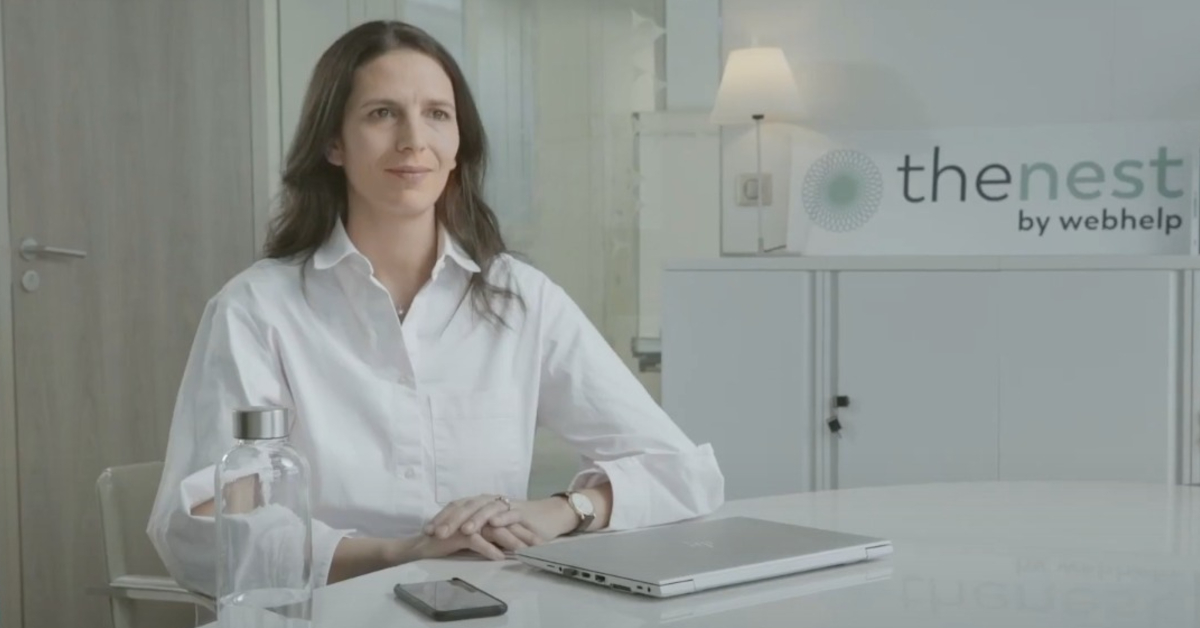Chloé de Mont-Serrat, Head of The Nest by Webhelp | Image credit: The Nest by Webhelp
In this age of digitisation, customer experience is the great equaliser. It can make or break a business, be it a startup or a unicorn. Nailing customer experience can be a tricky affair and requires careful analysis and understanding of customer behaviour. Unfortunately, the impact of the pandemic on customer behaviour was unprecedented and swift. Companies had to throw away their traditional CX playbook and improvise fast.
A recent study by Ricoh Europe polled 952 European office workers at firms with more than 1,000 employees. According to this study, “one in five (22%) believe their company has lost revenue during the pandemic as a direct result of poor customer experience.”
Here are the ten top international startups shortlisted for the 2021 Future Hamburg Award
Furthermore, the study also suggests that 58 per cent of employees believe their company could boost productivity and profitability if they introduced new technologies that improve how they engage with customers.
Paris-based Webhelp is a global customer experience and business solutions provider. It is the outsourcing partner of around 1000 companies to date, across a range of services, including customer engagement solutions (from customer care to community management), sales support and digital services (including content management and development support) to payment & regulated services.
Earlier this year, in March, Webhelp announced the expansion of its programme, The Nest by Webhelp, across Europe. This outsourced customer experience (CX) programme helps startups and fast-growth companies differentiate themselves and scale up their team quickly and simply.
Launched in 2018 in France, The Nest teams already participated in the success stories of numerous scale-ups in France and is expanding into the UK, Spain, Germany, The Nordics, The Netherlands, and Turkey. The programme claims to enable its clients to generate competitive advantages in the CX space by offering services such as omnichannel customer engagement services, B2B & B2C sales support or digital services, leveraging the long term experience of its “mother company” The Nest operates 24/7 and is available in more than 40 languages..
In order to better understand the significance of customer experience,, and how can startups refine their CX strategies, we caught up with Chloé de Mont-Serrat, Head of The Nest by Webhelp.
A unicorn with a startup mindset
According to Mont-Serrat, Webhelp, being a huge global player, could prove to be intimidating for some startups. These startups may think that might not get the attention they deserve while dealing with a big company like Webhelp. Mont-Serrat avers that this is not true at all, and that’s why Nest was created — in order to have a dedicated approach to these dedicated targets clients, irrespective of the size of the company.
The Nest makes the expertise of Webhelp, the European market leader for CX, available to emerging and fast-growing businesses, offering a unique and tailor-made outsourced CX proposition and a strong people-first culture.
Crucial asset for a company
According to Mont-Serrat, customer experience is one of the most important assets for a brand, even more, when the company is at the beginning of its journey.
In fact, a large part of successful startups today do not actually offer a “new product” (as you can think about a new phone or car) but focus all their attention, processes and technology on facilitating customer journey or finding new patterns for consumptions habits (e.g. Fintechs with banking services). A lean – and multichannel – customer experience is at the heart of their business model.
CX mistakes
Talking about some of the key mistakes that startups scaleups make in relation to customer experience, Mont-Serrat says, firstly, “companies don’t always choose communication channels based on the needs of their customers but more on their capacity to handle these. They sometimes struggle to find the right balance between the ultimate goal of offering a seamless 360-degree multi-customer experience and having full control over the support and costs for handling these channels. It’s important to be aware of the habits of your key customers in terms of preferred contact channels and to clearly define the expected service levels, their purpose in the customer journey etc.
Another key mistake is that some companies see all costs related to customer experience as a cost, not as an investment. She believes that it’s not the right approach. “It’s nearly impossible to provide accurate figures for the ROI of a company’s customer service.” Happy customers are the best promoters for your product, and the value of customer service must be approached with a larger scope as this gives companies the opportunity to upsell and cross-sell products, gather sales insights, better understand customers needs to improve their products and services, reinforce customer loyalty etc.”
“That’s why we recommend our clients to put in place the right KPIs and tools to monitor the impact of customer support and continuously improve it, such as regular CSAT surveys (Customer Satisfaction Survey), sentiment analysis on different channels, while linking these to sales and customer support performance data”
Another pitfall of some startups is to think about investing in the growth of their users and not in their retention, a rather “short termist” and costly behaviour, because – as an often quoted figure from a Harvard Business School study shows – it is 5 to 25 times more expensive to acquire a consumer than to retain him.
But when time and resources are constrained, a customer retention strategy is key to sustain this growth. Engaging your community, knowing your audience by analyzing the causes of churn and implementing loyalty programs is critical and these processes must be thought out from the beginning.
Finally, as Andréa-Lou Laffitte, Group Program Manager, The Nest by Webhelp, points out, while startups often have in mind the importance of the “Voice of the customer”, they are often slow to implement a structure that enables them to organize and centralize their data between consumer channels, their CRM and their product teams. And as their consumer base grows, it’s harder to change these habits.
Fortunately, startups have more and more tools at their disposal to facilitate this. It is essential to take time in the first months of operations to think about how to set up solid processes to centralize data from all consumer channels, to continuously update advisors’ training books, to have very regular feedback between customer support and product teams to quickly adapt products according to consumer feedback…
The Nest mission
As Charles Egly, Founder of Younited Credit, and one of the first startups to join The Nest by Webhelp program, testified: “In the early days of a startup, the senior team often try to tackle all the issues head-on, sometimes to the detriment of the final product or service. The outsourced support that The Nest program offers was invaluable to expand our team and provide reinforced expertise. It also allowed us to conquer new markets much faster. Working with an outsourced partner in this way offers increased efficiency, lower operating costs, more flexibility, and faster time-to-market. Not to mention, access to the best processes and tools on the market, most of which are usually too costly for a startup.”
The Nest also offers its clients access to ‘The Nest Community.’ This resource will offer members mentoring, business development, and networking opportunities as an additional way to generate traction and achieve better results through a strategic startup network.
CTA: Want to learn about The Nest by Webhelp? Get in touch with them via their website.
Here’s how to build one that doesn’t, according to this expert…



![Read more about the article [Funding alert] Gobbly raises Rs 7.2 Cr in pre-Series A led by Anicut Angel Fund and Sauce.VC](https://blog.digitalsevaa.com/wp-content/uploads/2021/09/Funding-Round-1631085424610-300x150.jpg)






